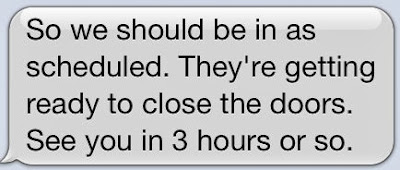A while back I wrote about the
wandering adventures of my father's grandparents, and that one of the places they ended up was the community of White Salmon, in Klickitat County, Washington. This move was sort of a family affair - a number of relatives came from Texas to White Salmon about that time, among them grandmother Dora's parents and her sister, Minnie Elliott, my great grand aunt, then in her early twenty's. Many years later, Minnie wrote down her "remembrances" of that time. Here are words, in her spelling (and punctuation).
"Several people have ask me to write a sketch of experiences of the earley settlers of Klickitat Co Wash. In the early 60's or even back in to the late 50's, there were some homesteaders coming into that county who settled first on the north slopes and valleys along the rolling Columbia river. A Mr. Joshlen and wife were the first to settle at White Salmon in Klickitat Co. At that time there were many uncivilized Indians lived there."
"The Joshlans was run out three times from their home by the hostile Indians. The last time, was when they were told by friendly Indians that the hostiles were coming they crept through the bushes to the river, crossed to Hood River where lived 3 families, but a man and a 14 year old boy lived with them and worked for Mr. Joshlen, stayed to try to impress the hostiles that there were several men in the house, this one man on seeing the Indians riding to the bluff looking over the valley, he would dress in all the different suits of cloths on the place and walk about with them on."
"Late in the day he and boy made a few sandwitches and put in their pockets, took the milk buckets on their arms, and walked out to the barn and milked the cows, while doing so they would hear Indians giving each other the information by their code in whistling, grunting, and hisses. Several arrows were shot in to the corral where they were. The men took the milk into the house, drank some and slipped out a side door that enabled them to conceal themselves by timber and reached the river to find that their extra boat had been stolen.
They crept up the river for several miles, hid themselves in the rocks where they could see miles down the river. Some time the third day they saw the little Mary coming up the river. They signaled the boat to stop for them and were taken to Hood River. The camouflaging of the different clothing was all in vain, the red men burned their house and cut their little orchard down."
"Harry Jewett and wife were the first white people to settle on the bluff. They came there in 1874, and built log cabins on diffient places but later they concluded they wanted the place where the Indian chief Quemps was camped on the place chosen; so they gave him a sack of flour, several sacks of potatoes and other vegetables and $5 for to move to a little valley at the foot of the mountaint called Elephant Back; there he give him a life time home."
"When the Jewetts had been there 41 years quite a number of the citizens gathered on their lawn to celebrate the day. Quemps second son Charley was invited to attend. He came and made a good talk which brought laughter, tears, and sobs from the Jewetts. When Charley speak of the trade said he was a little boy but when any body was good to them they never forgot it; said in his own words Jewett put his hand on my head told me how to talk Boston man talk he all time good to my old folks all time good to white folks too. Sometimes we wouldn't have any thing to eat but little fish, little camos roots, big snow on my ground father tell Jewett he all time give us little money some thing to eat. I wish all time they have good time, and people be good to Jewett and wife."
"Well does the writer remember the day we attended the funeral of the chef's wife, Lucie Quemps. she was buried on a hill over looking her home. When we arrived in the yard we could see between the roof and some tooley mats; the corpse, was laying on some matting covered with a blanket we saw only a small portion of her face and head there were three crimson feathers stuck in her hair. There were about 40 men women and big children, took part in dancing around the corpse beating three big drums, five tom toms, lots of bells were clattered as only cow bells can be clattered, the drums were of their make and was of horse hide. O what a noise."
"Quemps, Yalep, Joshua and Jackob Hunt, all Indians, came to the Jewetts and ask them to ask the rest of the white people to meet them at a appointed place and ask God to make the Indians good and not kill white people any more. Yalop was spokesman appointed the place of meeting under a big pine tree it stood near the South East comer of the Congregation church which was started to be built in 1879 but wasn't finished till 1884. The pine tree was cut down about the year of 1910 by men whom where making roads. No doubt they knew nothing of it as a early place of worship by whites and Indians."
"The first meeting was attended by Mr. Warner and wife, Mr. Joshlen and wife, Mr. Jewett and wife. A Mrs. Dr Simons of Vancouver who took a active part in helping to civilise the Indians, there were 11 white people about 50 Indians sat or stood near the pine tree between 4 and 500 Indians gathered a little father a way on horse back or on foot; the homesteaders at first felt a little worried but was soon at ease, they had brought some food and handed it out, they sang talked, prayed most of the day."
"Mrs. Warner had brought a melodian with them and played it while Mrs. Jewett led in singing O! I can now imagine I can hear that clear musical voice ring out through those lofty pines. Was said by Dr. Simons that Yalop dropped on his knees and chanted a prayer, said it could be seen from the expression of his face and tone of his vois that he was sincere as any prayer that she ever had heard from any one of any nationality. Those meeting were held at intervals until enough homesteaders came in to start building a church near the pine tree, where Yalop had ask God to let them build and to make the bad Indians quit killing white people. There were no more people killed in that county the church was built overlooking the rolling Columbia."
"The first 9 years of the 30 years I lived there we meet the Sunday school surpentend Mr Warner each Sunday morning that the weather would permit us to, and have Sunday school and may be some minester would deliver a surman. I had the childrens class and had time to speak with the Indalns that some times came, and would give them some bright culerd cards we knew sevral of them were children and grand children of Jacob Hunt. I have a basket made of one peice of ceder bark that Hunt made; it was given in 1910 to me by his youngest daughter Susie, was made to carry huckel berries in, helt 2 1/2 galons. I always felt she gave it to me in apereachion of those sunday school cards that were given her 20 or more yers before."
"In the summer of 1890 was the last trip for a little old indain woman to come in the neighborhood with her blankets on her back, am shure she was the oldest person any of us ever saw was said she was more than 100 years old, she knew the country well but couldn't speak any langueg except her owen. would pick up fruit on the Jewett ranch and dry it, get fish from the White Salmon river and dry them also, dry berries. It was said she belonged in the Yacama district, and it took her three months to make the round trip caring her blankets also carry her dryed food back home."
"One Sunday morning just as we went to class at Sunday school she walked in blankets and all in frunt of the pulpit she stoped looked to the seeling and said Hi! Hi! Hi!! Apearently she thought she was making her words more forceabel she stamped one foot down on the fioor then laughed aloud he he he, turned and walked out. She was so bent over her packs lay on her back as on a horses back, she at all time while travling she carried a cammy root diger not more than two feet long made from a iron rod flatened at one end a stick on ther end like the handel of a orgor when she stoped would stick the sharp end in the ground and lean with bouth hands on the handel. On the following Monday she started home but never came back to White Salmon."
"By the year of 1892, people had come in to the White Salmon district and taken up homesteads that those back 2 and 4 miles back concluded it was too far to walk down to the church by the pine tree. So on the 13 day of Jan 1892 we mett at Peter Groshong the father of Frank and A. B. Groshong now of White Salmon.
Each of us taken a picknick basketts The men walked up on the hill by the road there Mr. Groshong declared a spot of land on his homestead to build a log church, so they went to work cuting down trees, sawing off logs for the walls also sawing off shake blocks, making shakes to cover the church and nail over the cracks in side drove chinkings in the out side cracks. later in the week the door was mad and hung two windows put in and a few backles binches was made. A Mr. Hixan delivered the first serman in it. He was a wonderful man have been told he died at the age of 103 years old in the Yakima district."
-- Minnie Elliott Purser



















